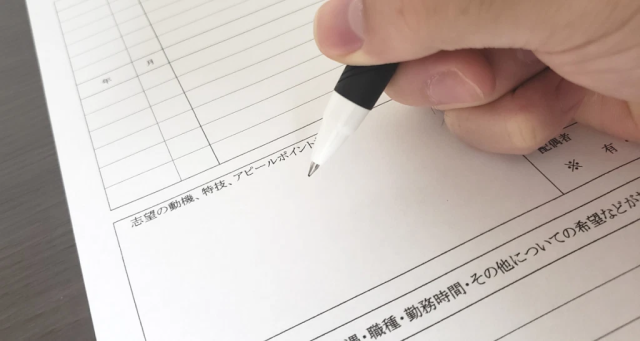
How to turn that blank in your resume into the inspiring story of your life so far.
Japan has a number of unofficial holidays celebrated by those in the know, usually based on an alternate reading of the date. For example, November 28 is Knee-High Socks Day, and May 10 is Maid Day.
And February 10? Well, if you write it as 2-10, and use the secondary reading in Japanese of ni for 2 and to for 10, you get nito, which sounds just like NEET, the Japanese term for a person not in education, employment, or training, and so February 2 is NEET Day.
While he’s part of the workforce now, our Japanese-language writer Daiki Nishimoto was a NEET for eight years, up until 2019, and today he’d like to share how he got out of the NEET life.
▼ Daiki
Take it away, Daiki:
– – – – –
I don’t have much to say. It’s not like I have as many ways to escape being a NEET as there are fingers on a hand, or even eyes on a face. If you’re a NEET who’s looking for a job, the blank in your resume is a handicap, and the only way to overcome it is…
…to fess up and boldly own the fact that you’re a NEET.
That’s the only way. I know it sounds simplistic, and some of you are probably scratching your heads right now, but I’m serious when I say that owning up to your NEET status is vitally important.
So what specifically did I do? I didn’t hide the fact that I’d been a NEET for eight years on my resume and applications. I had no prior experience as a professional writer, so in the “related work experience” section of my application, I wrote “None,” and instead just listed the extremely limited part-time jobs I’d done in the past. I didn’t lie about anything. I may have been a NEET, but I was an honest NEET.
Just doing that would have left my chances of getting a job at basically zero, though, so in the self-introduction section of my resume, I wrote about what I’d been doing during my time as a NEET. Really the only noteworthy thing I’d done was to try writing a novel, so that’s what I wrote about.
Just as important, I also wrote about what I’d learned while doing that. I wrote about how it had helped me learn to focus on a goal, and appreciate the need to keep making efforts toward it. The key was to somehow show some kind of positive trait or ability I could bring to a workplace.
Regardless of how small or insignificant you might think your positive aspects are, it’s important to portray them clearly. You have to be honest too, because if you lie, eventually you’ll get found out. But you need to find something that can give you an edge, and for me that was being boldly, even shamelessly, honest about myself, and my time as a NEET.
If you don’t have any experiences you can talk about from your time as a NEET, then talk about when you were in school. If there’s nothing for you to talk about from that part of your life either, then find some new challenge or project, start working at it, and then write about that in your resume.
Without question, you’re still going to be at a disadvantage compared to people who don’t have such a large blank in their professional/formal educational experience. The only path out of my situation, though, was to create something positive from my time as a NEET.
– – – – –
Daiki is quick to add that there’ a difference between being bold and being arrogant. You don’t want to come off as saying “Yeah, I was a NEET. So what? Wanna fight about it?” Rationalizing or making excuses for why you became a NEET won’t win you any points with prospective employers either, especially if situation was partially your own doing.
Still, it’s important to not beat yourself up over being a NEET, or to feel ashamed of your past. Once Daiki started being open and honest about a NEET, he gradually became able to keep his head up in interviews, leaving a better impression than if he’d spent the entire conversation acting meek and hesitant. Even when he got turned down for jobs, he felt less regret because he’d done all he could, leaving him with more energy to start looking for another position to apply for, until eventually he graduated from being a NEET by securing a paying job.
Once again, Daiki wants to make it clear that he’s not saying “Hey, don’t feel bad about being a NEET because it’s a great way to spend your life!” But since you can’t change the past, accepting yourself as a current NEET, and finding something, anything good that status has led to, then being confident enough to put that front and center when you present yourself, is how Daiki took the first step towards the future he wants.
Photos ©SoraNews24
● Want to hear about SoraNews24’s latest articles as soon as they’re published? Follow us on Facebook and Twitter!
[ Read in Japanese ]





 NEET “recruitment” video pokes fun at Japan’s laziest
NEET “recruitment” video pokes fun at Japan’s laziest In Japan, Uber Eats will deliver the latest manga to your door
In Japan, Uber Eats will deliver the latest manga to your door Japanese Twitter freaks out over cartoonist’s cute cat freaking out over its tail 【Video】
Japanese Twitter freaks out over cartoonist’s cute cat freaking out over its tail 【Video】 We try Tokyo’s new and trendy “smoky ramen” for a fragrant experience 【Photos】
We try Tokyo’s new and trendy “smoky ramen” for a fragrant experience 【Photos】 Japanese dad teaches son WAY too much about working adult life with visits to role-play park
Japanese dad teaches son WAY too much about working adult life with visits to role-play park How to order snacks on a Shinkansen bullet train in Japan
How to order snacks on a Shinkansen bullet train in Japan Demon Slayer: Kimetsu no Yaiba gets new roller coaster attractions and food at Universal Studios Japan
Demon Slayer: Kimetsu no Yaiba gets new roller coaster attractions and food at Universal Studios Japan New samurai glasses are Japan’s latest weird must-have souvenir
New samurai glasses are Japan’s latest weird must-have souvenir Burger King Japan suddenly adds Dr. Pepper and Dr. Pepper floats to its menu nationwide
Burger King Japan suddenly adds Dr. Pepper and Dr. Pepper floats to its menu nationwide Nintendo history you can feel – Super NES, N64, and GameCube controllers become capsule toys
Nintendo history you can feel – Super NES, N64, and GameCube controllers become capsule toys High-fashion Totoro cuddle purse is like an elegant stroll in the forest【Photos】
High-fashion Totoro cuddle purse is like an elegant stroll in the forest【Photos】 Japan’s new difficult-to-drink-from beer glass protects your liver, but it’s a brutal experience
Japan’s new difficult-to-drink-from beer glass protects your liver, but it’s a brutal experience Kyoto Tower mascot termination reveals dark side behind cute Japanese characters
Kyoto Tower mascot termination reveals dark side behind cute Japanese characters New Pokémon ice cream, dessert drinks, and cool merch coming to Baskin-Robbins Japan【Pics】
New Pokémon ice cream, dessert drinks, and cool merch coming to Baskin-Robbins Japan【Pics】 To combat declining birth rate, Japan to begin offering “Breeding Visas” to foreigners
To combat declining birth rate, Japan to begin offering “Breeding Visas” to foreigners Hello, cosmetics! Clinique teams up with Hello Kitty this summer for first-time collaboration
Hello, cosmetics! Clinique teams up with Hello Kitty this summer for first-time collaboration “The most Delicious Cup Noodle in history” – Japan’s French Cup Noodle wins our heart【Taste test】
“The most Delicious Cup Noodle in history” – Japan’s French Cup Noodle wins our heart【Taste test】 Starbucks releases a cute Frappuccino and Unicorn Cake…but not in Japan
Starbucks releases a cute Frappuccino and Unicorn Cake…but not in Japan McDonald’s Japan’s Soft Twist Tower: A phantom ice cream only sold at select branches
McDonald’s Japan’s Soft Twist Tower: A phantom ice cream only sold at select branches Yabai Ramen: What makes this Japanese ramen so dangerous?
Yabai Ramen: What makes this Japanese ramen so dangerous? Finally! Nintendo Japan expands Switch 8-bit controller sales to everybody, Online member or not
Finally! Nintendo Japan expands Switch 8-bit controller sales to everybody, Online member or not Japanese government wants to build luxury resorts in all national parks for foreign tourists
Japanese government wants to build luxury resorts in all national parks for foreign tourists 10 things you should buy at 7-Eleven in Japan
10 things you should buy at 7-Eleven in Japan Studio Ghibli releases anime heroine cosplay dresses that are super comfy to wear
Studio Ghibli releases anime heroine cosplay dresses that are super comfy to wear Woman charged for driving suitcase without a license in Osaka
Woman charged for driving suitcase without a license in Osaka Studio Ghibli unveils My Neighbour Totoro miniature house model
Studio Ghibli unveils My Neighbour Totoro miniature house model Kyoto experiencing problems with foreign tourists not paying for bus fares, but not on purpose
Kyoto experiencing problems with foreign tourists not paying for bus fares, but not on purpose Fighting mild hunger with a Japanese soda that turns into jelly in the stomach【Taste test】
Fighting mild hunger with a Japanese soda that turns into jelly in the stomach【Taste test】 Studio Ghibli’s Howl’s Moving Castle tapestry unveiled in Japan for first time
Studio Ghibli’s Howl’s Moving Castle tapestry unveiled in Japan for first time McDonald’s new Happy Meals offer up cute and practical Sanrio lifestyle goods
McDonald’s new Happy Meals offer up cute and practical Sanrio lifestyle goods Sales of Japan’s most convenient train ticket/shopping payment cards suspended indefinitely
Sales of Japan’s most convenient train ticket/shopping payment cards suspended indefinitely Sold-out Studio Ghibli desktop humidifiers are back so Totoro can help you through the dry season
Sold-out Studio Ghibli desktop humidifiers are back so Totoro can help you through the dry season Japanese government to make first change to romanization spelling rules since the 1950s
Japanese government to make first change to romanization spelling rules since the 1950s Foreigner’s request for help in Tokyo makes us sad for the state of society
Foreigner’s request for help in Tokyo makes us sad for the state of society Ghibli founders Toshio Suzuki and Hayao Miyazaki contribute to Japanese whisky Totoro label design
Ghibli founders Toshio Suzuki and Hayao Miyazaki contribute to Japanese whisky Totoro label design Doraemon found buried at sea as scene from 1993 anime becomes real life【Photos】
Doraemon found buried at sea as scene from 1993 anime becomes real life【Photos】 Tokyo’s most famous Starbucks is closed
Tokyo’s most famous Starbucks is closed Princesses, fruits, and blacksmiths: Study reveals the 30 most unusual family names in Japan
Princesses, fruits, and blacksmiths: Study reveals the 30 most unusual family names in Japan Wet rice crackers? Trying nure-senbei for the first time【Taste test】
Wet rice crackers? Trying nure-senbei for the first time【Taste test】 To handwrite, or not to handwrite? Recruiter lays into ‘laziness’ of young Japanese job hunters
To handwrite, or not to handwrite? Recruiter lays into ‘laziness’ of young Japanese job hunters Trying Häagen-Dazs Japan’s Brûlée Brûlée Brûlée for a taste of, well, crème brûlée
Trying Häagen-Dazs Japan’s Brûlée Brûlée Brûlée for a taste of, well, crème brûlée What are McDonald’s macarons really like in Japan?
What are McDonald’s macarons really like in Japan? Is this newly released sweet konnyaku, jelly or pudding? We try to sort out the custardy chaos
Is this newly released sweet konnyaku, jelly or pudding? We try to sort out the custardy chaos Uber Eats delivers movie theater popcorn at certain Tokyo and Chiba locations
Uber Eats delivers movie theater popcorn at certain Tokyo and Chiba locations Guilt-free snacking with 129-calorie bags of faux fried pork Innocent Tonkatsu
Guilt-free snacking with 129-calorie bags of faux fried pork Innocent Tonkatsu Beautiful cosplaying takoyaki chef is so talented it’s tearing eyes off her anime outfit【Video】
Beautiful cosplaying takoyaki chef is so talented it’s tearing eyes off her anime outfit【Video】 Japanese ramen chain elevates convenience store food with new microwaveable noodles【Taste test】
Japanese ramen chain elevates convenience store food with new microwaveable noodles【Taste test】 Prototype snacks One Hand On available in beef bowl and soba restaurant curry flavor【Taste Test】
Prototype snacks One Hand On available in beef bowl and soba restaurant curry flavor【Taste Test】 Thai anti-drinking PSA is surprisingly compelling 【Video】
Thai anti-drinking PSA is surprisingly compelling 【Video】 Student tries to advertise his university club at station, accidentally uses a picture of himself
Student tries to advertise his university club at station, accidentally uses a picture of himself Pizza Hut Japan’s pickled plum pizza is mercilessly aware of what it is【Taste test】
Pizza Hut Japan’s pickled plum pizza is mercilessly aware of what it is【Taste test】 Got a question for Haruki Murakami? Website lets you ask the author directly, and in English, too
Got a question for Haruki Murakami? Website lets you ask the author directly, and in English, too
Leave a Reply